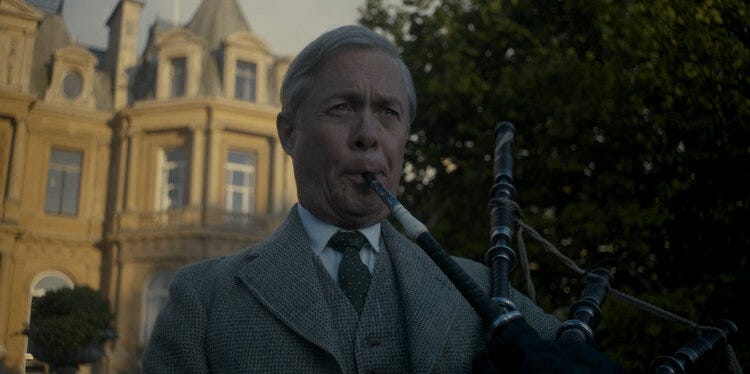As a reminder, I’m Eugene Wei, a former product exec at places like Amazon, Hulu, Flipboard, and I’ve kept a personal blog Remains of the Day since 2001, offering what I like to think of as “Bespoke observations, 80% fat free”, though the amount that is fat will vary depending on your tastes in technology, media, and all the other random topics I write about.
Two posts in two days, we’re going streaking! Today I thought I'd take a break from status discussions to discuss The Crown, whose third season drops on Netflix this weekend. But as I started writing, I realized this post is also about status, and while someday I will resume talking about something else, today is not that day.
“When a judge walks into the room, and everybody stands up, you’re not standing up to that guy, you’re standing up to the robe that he’s wearing and the role that he’s going to play. What makes him worthy of that role is his integrity, as a representative of the principles of that role, and not some group of prejudices of his own. So what you’re standing up to is a mythological character. I imagine some kings and queens are the most stupid, absurd, banal people you could run into, probably interested only in horses and women, you know. But you’re not responding to them as personalities, you’re responding to them in their mythological roles. When someone becomes a judge, or President of the United States, the man is no longer that man, he’s the representative of an eternal office; he has to sacrifice his personal desires and even life possibilities to the role that he now signifies.”
Joseph Campbell and Bill Moyers' The Power of Myth
When I think of Netflix's originals taking the leap to that level of professional craftsmanship that put them in that tier considered "premium video," for however long that term endures, the show that leaps to mind is The Crown, one of my favorite of their homegrown series. House of Cards came earlier, and landing that Fincher production with that cast was a massive coup, but The Crown, with its focus on the English monarchy, carries that air of gentrified prestige that seems apt in a discussion of what qualifies as professional film and television.
The Crown is comfort food for those who prize a level of tightly structured scripts, lavish production design that likely broke out a line item for brocade, precise diction from the school of classical acting that could wouldn’t feel out of place on the stage at the Old Vic, upper lips as stiff as the creases in the tailored English suits on display, long glances freighted with import...in other words, all the trappings of aristocratic melodrama. The portentous theme song by Hans Zimmer is one that, like the theme to Game of Thrones, I won't skip, just so I can wrap it around me like a gravity blanket in anticipation for the theatrics to come. The entire affect of the show dances on that fine line between spectacle and farce; rarely has a program treated a group of people who do so little with such gravitas.
But, and I cannot stress this enough, that is the point.
Why do we treat the Royal Family with such reverence? Because ceremony demands it. Sometimes status is a closed circle, and if you trace it you end up where you started. The very act of walking in that circle, though, closes it. The Royal Family has whatever power the people grant them.
The very existence of The Crown, the white velvet gloves with which the show handles its subject, enacts, in televisual form, the act of veneration upon which the Royal Family depends for its status. The show bends the knee, and so do we.
No episode better reflects the way in which our construction of royalty and celebrity rhyme than season 1, episode 5 of The Crown, titled "Smoke and Mirrors." This episode is about the covenant between the famous and those who grant them that fame. It's figuratively, and sometimes literally, smoke and mirrors which turn a plain English woman into a queen. In an age where the internet has once again reshaped the distribution topology of moving images, and given that the Crown returns for its third season this Sunday, it seemed the right time to do a walkthrough of this, an episodes of TV I’ve seen many times and which never ceases to move me.
Episode SPOILERS ahead, obviously, though this is one of those programs where spoilers don't mean much. The journey of watching this show is the experience. I encourage you to grab your remote, fire up Netflix, and follow along. Honestly, if you haven't watched episodes 1 through 4 of season one, it's still fine, but if you want, binge those and then follow along here. I haven’t done an episode walkthrough on my blog before, and honestly this would be better as a video essay, but good luck with that given all the legal hurdles. As it is, Netflix makes it so difficult to grab screenshots of their content that I could only grab so many before losing patience, but I'll drop in some relevant shots from time to time to help you follow along (Netflix, make it easier to grab and share screenshots of your stuff, your whole competitive advantage is economies of scale, you want to overwhelm the competition with your digital footprint in the cultural conversation).
The episode begins with a flashback to May 11, 1937. Young Elizabeth is summoned, by her father, on the cusp of becoming King George VI, played by the always magisterial Jared Harris. He'd like her to play the role of Archbishop as he prepares for his own coronation. As she reads over the script of the coronation oath, her father explains the significance of the words. She stumbles over a word she doesn't recognize.
Her father pronounces it for her. "Inviolably. It means, to make a promise you can never break. A very sacred promise indeed." He is instilling in her a sense of the heavy obligations transferred in this ceremony, ones which form the foundation of the power of the throne.
They're interrupted by Private Secretary Tommy Lascelles telling George it's time to go try on the crown. George asks for a bit more time with Elizabeth. "We haven't even reached the anointing!"
George turns to his daughter.
"You have to anoint me, otherwise I can't be King. Do you understand? When the holy oil touches me, I am transformed. Brought into direct contact with the divine. <cue the track “The Anointing” by Rupert Gregson-Williams> Forever changed. Bound to god. It is the most important part of the entire ceremony."
George refers both to the ceremony by which he becomes King but also the power of film itself. We as the audience anoint movie stars, musicians, and athletes, and by our adulation, they are forever changed. Fame and status are a covenant between gods and their disciples, just as brands exist in the covenant between companies and their customers.
Elizabeth follow her father to the fitting for the crown.
As George lifts the crown over, he notes, "Goodness, it's very heavy indeed."
"Five pounds," says the attendant.
"Not to mention the symbolic weight, hmm?" replies George. Heavy is the head that wears the crown, in every sense.
He looks at himself in the mirror, then turns to look at his daughter, who gazes back.
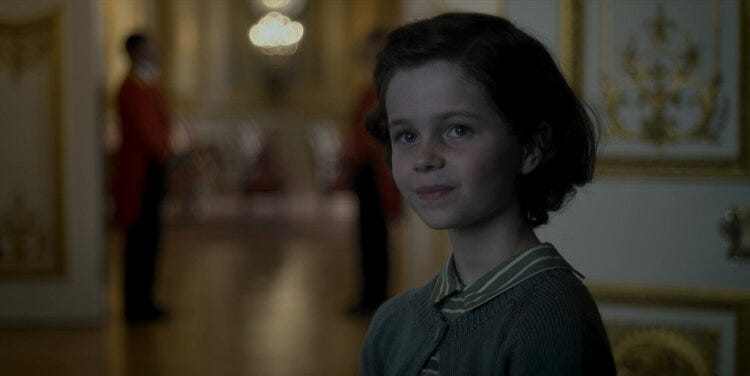
He returns her gaze.
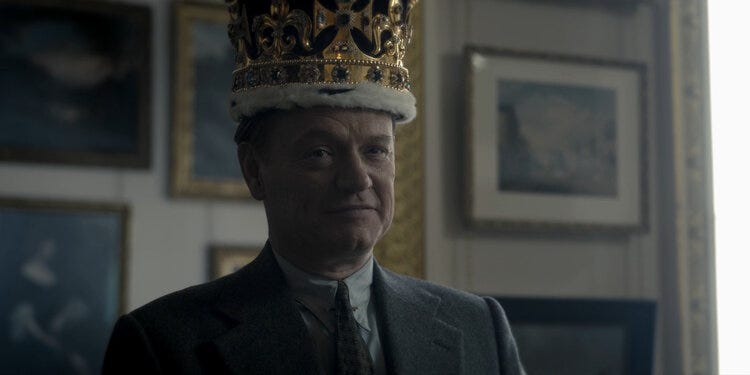
Match cut to the present day, where 25 year old Elizabeth places the crown on her head (she is played to perfection by Claire Foy, whose massive shoes Olivia Colman will have to fill in season three). The now grown Elizabeth is standing in the exact spot where she once stood and watched her father don the crown, such that her eyeline matches that of her father's in the past.
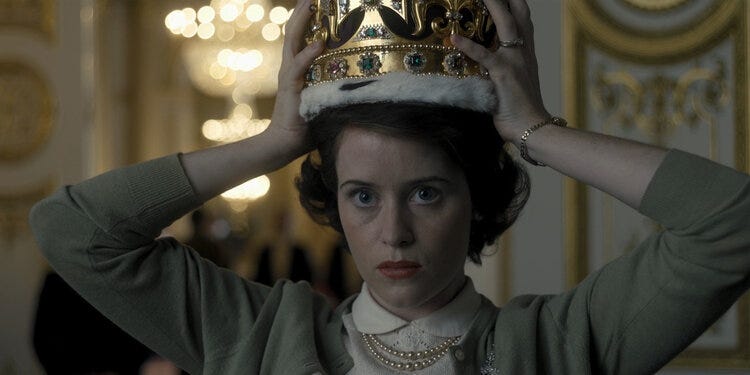
They cut back to George in the past one last time, giving a wry smile to his daughter across 17 years. Soon she will shared the burden of the titular crown.
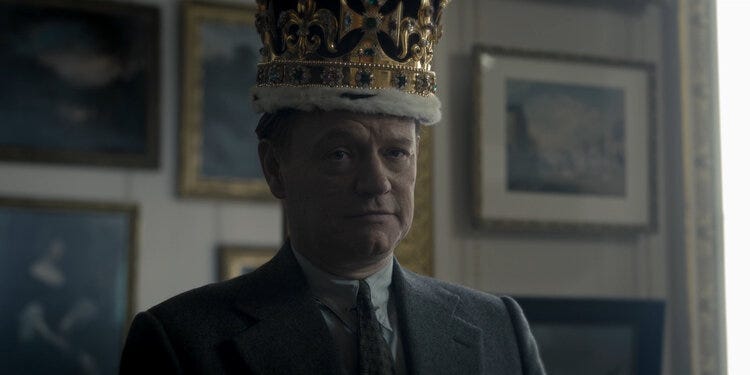
"It's not as easy as it looks," says Elizabeth, trying to balance the crown on her head.
"That's exactly what the King said," replies the very same attendant who had been at that shared moment in the past, bridging another generation of royalty.
"I remember," says Elizabeth.
It's the type of meticulously composed shot sequence typical of the series, and this scene always gives me all the feels upon rewatch.
That evening, Elizabeth approaches her husband Philip (played with smarmy charisma by Matt Smith; seriously, this entire cast knocks it out of the park) as they dress in their finest for the ballet. She announces that she'd like him to take over as chairman of her coronation committee.
"I want to make a public declaration of my trust in you," she says to her husband. Everything they do has symbolic value, and she understands the importance of her every act in the eyes of the public.
"There's no need to matronize me," he retorts, using the feminist form of the more common "patronize." An ongoing storyline the first two seasons is Philip's discomfort with standing behind his more powerful wife. Behind every great woman is a jealous man yearning for a return of the patriarchy?
At the ballet, Philip, having mulled it over, gives in. However, he has a request. "Total control or nothing at all. Those are my terms."
"All right. But don't go mad," says Elizabeth.
"What does that mean?" he asks.
"It means just don't go mad. It's a coronation. A service that goes back a thousand years. Some things can't be changed," she says.
The immutability and consistency of tradition and ritual reflects but also reinforces power. As Stewart Brand once wrote of government buildings, there's a reason they are constructed of marble and stone, often in the style of ancient Greek or Roman architecture. The unchanging nature of the building is meant to convey the durability of the institution.
"Yes, yes, all right," says Philip, but his sentiments will soon change.
Now we cut to Paris, where the ingenious construction of this episode begins to reveal itself. Not only is this episode about the very act of television and its ability as a medium to grant power, but the writer embeds a commentary on the coronation within the episode itself. Or commentator, to be precise, and his name is Edward, Duke of Windsor, or David. He was forced to abdicate the throne in 1936 for marrying Wallis Simpson, an American woman twice divorced, and his eviction still stings. Throughout this episode, David Windsor serves as a proxy for how non-royalty view the coronation. Asked by the royal family to not attend the ceremony given what they perceive as his shameful abdication, he will be forced to watch from a viewing party he hosts from his home of exile in Paris.
David and his wife Wallis sit for a magazine profile, posing in a variety of foppish outfits. They may not be tip top royalty anymore, but they're not paupers. Still, as status is relative, and he since he once reached the footstep to the throne, he struggles to find contentment in his current lot in life. The episode traces the very specific nature of his jealousy and resentment, but the general contour of his longing matches that of status-seekers everywhere.
David and Wallis lead the reporter to a private attic room where he keeps mementos of his past glory.
"Goodness. Bagpipes, too," says the reporter, glancing at all the memorabilia filling the room.
"Yes, I play," says David.
"When he gets homesick," adds his wife.
"And all these photographs of you as King," asks the reporter. "There are none with the crown. Why is that?"
"I never made it that far. I never had a coronation." This isn't fear of missing out; he just plain missed out.
Back in England, Elizabeth announces to her staff that she has decided her husband will be chairman of her coronation committee. Her Private Secretary Tommy says that's impossible as it's the job of the Duke of Norfolk, the chief butler of England. "Running the coronation, that's what the Norfolks do," says Tommy. That's why we call it tradition, girlie.
Elizabeth cuts the debate short. "The chairmanship with full autonomy is what he wants. Therefore it is what I want. Norfolk can be vice-chair." You want zee duck? You cannot have zee duck. You can have zee chicken.
David returns to London to visit his ailing mother Mary, and while there Private Secretary Tommy and the Archbishop deliver the bad news: the Duke of Windsor and his wife aren't welcome at the coronation. David goes on an extended diatribe, calling the Archbishop "Auld Lang Swine," and he quips, in a letter to his wife, that his mother, who passes away while he is England, had blood that ran as "icy cold when she was alive as it does now she's dead." No one bitch slaps as poetically as the English.
In the same letter, as we see a shot of David talking to Elizabeth, we hear him refer to the incoming Queen as "Shirley Temple" and his other family members as "desiccated hyenas." This club was dead anyway, says the guy turned away at the door, through his tears.
At Mary's funeral service, Philip notes to Elizabeth that this ceremony is exactly like her father's funeral service. Tradition is so rigid in English corridors of power that nothing changes. He vows her coronation will be different, to reflect her, a young woman, and the "fast-changing, modern world."
At his first coronation committee meeting, Philip presents his thoughts.
"The eyes of the world will be on us. Britain will be on show, and we must put our best foot forward. In such circumstances, the temptation is to roll out the red carpet and follow the precedent set by the grand and successful coronations of the past. But looking to the past for our inspiration would be a mistake in my view."
Philip recognizes that when it comes to the power of his wife’s throne, ritual and reality are in many ways inseparable, and the only way to alter the nature of her power is to adapt the ceremonies that construct it.
He continues. "Make it less ostentatious, more egalitarian, show more respect and sensitivity to the real world. We have a new sovereign, young, and a woman. Let us give her a coronation that is befitting of the wind of change that she represents, modern and forward-looking at a moment in time where exciting technological developments are making things possible we never dreamt of which brings me to my next point..."
And what, pray tell, is that technology? Television. Of course, we are watching him talk about this on a television series streamed through an application called Netflix that is itself an adaptation of television itself, and you’re reading about my discussion of this episode through the internet. Also, later David Windsor will describe the coronation ceremony to an audience viewing the coronation on a television at his house in Paris. This episode is thematic Inception and I am here for it, every bit.
The committee is horrified by Philip’s plan. At Westminster Abbey, where preparations are underway, one committee member examines a television camera with apprehension and disgust and asks Philip, "No close-ups, huh? Zoom lenses?" In the aristocracy’s classical conception of power, physical distance is how status gaps are both constructed and measured. Normal people aren't allowed in to see the coronation because they are meant to feel every bit of the expanse between them and the throne.
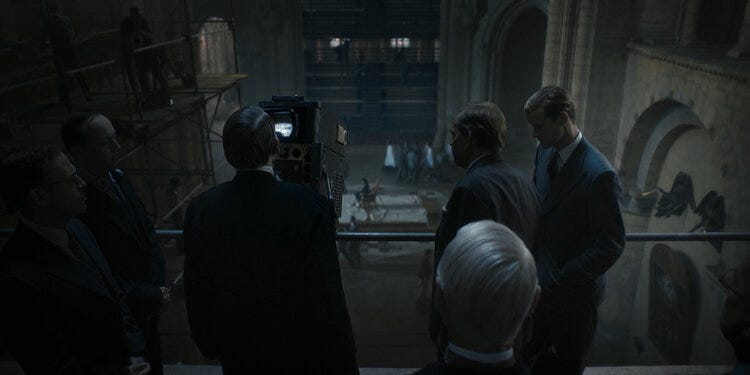
Coronation committee members gaze through a TV camera at Westminster Abbey during preparations for the ceremony. Meanwhile we look at them through the gaze of a camera that was pointed at them on set.
But film is its own medium, with its own peculiar powers, and one of those is its ability to alter our spatial reality. When the close-up was invented in film, it unlocked a unique advantage of cinema over theater, the ability to bring us closer to a person than we'd be even in real life. If you were to put your face up against someone so that their face filled your field-of-view as much as a film close-up, you'd be arrested for assaulting their personal space. But in film, we can be simultaneously abstracted from the characters on screen yet halfway up their nostrils.
The craft of acting changed with the advent of the close-up. No longer was it necessary to act in so broad a style ("Why I oughta smack you in the kisser!" overacts the old black and white film cowboy). Now, the most subtle of facial expressions, the tiniest crease of one's brow, could register several feet high on the silver screen.
But more than that, the close-up, in closing distances, offered an alternative to spatially remote constructions of power in favor of a new relationship between star and audience, that of emotional intimacy. The Crown is emblematic of this quality of the film and television medium, spending its long story arc humanizing the Queen of England, transforming her from a remote caricature into a three-dimensional human with a rich and legible inner life. Prior to seeing The Crown, my regard for the Royal Family was, at best, dismissive. They still are. However, my feelings towards the fictional character Elizabeth from The Crown, the one played by Claire Foy, is one of deep sympathy. It's not that film can't do shock and awe but that other mediums struggle to match the moving picture for emotional intimacy.
In a way, the hidebound coronation committee is right to be concerned over Philip’s plan. Television as a medium did reconfigure the modern world, and it continues to hold the power to topple established power structures. Winston Churchill (John Lithgow) brings the concerns of the committee to Elizabeth.
"What is the purpose of the Crown? What is the purpose of the monarchy? Does the crown bend to the will of the people to be audited and accountable? Or should it remain above temporal matters?"
When the dominant medium of an age shifts, the nature of power shifts with it. Churchill is asking Elizabeth, but also asking himself, whether the advent of television means the two of them must change the means by which they relate to the people they govern.
Ultimately, he leaves the decision in her hands. She visits Philip at the Abbey where they debate his proposed changes.
She confronts him, "Trade unionists and businessmen? In the Abbey?"
"If you want to stay on the throne, yes," he replies.
"In a trimmed-down televised coronation?"
"If you want to avoid a revolution, yes. You forget, I have seen first-hand what it is like for a royal family to be overthrown because they were out of step with the people. I left Greece in an orange crate. My father would have been killed. My grandfather was. I'm just trying to protect you."
"From whom? The British people? You have no idea who they are or what they want." She continues, "If the people are hungry, they want something that lifts them up."
"And how do you propose lifting them if they cannot see it?" he fires back.
"The people look to the monarchy for something bigger than themselves. An inspiration. A higher ideal. If you put it in their homes, allow them to watch it with their dinner on their laps..."
"It will democratize it, make them feel hat they share in it. Understand it." Rewatching this episode today, I can’t help but think of AOC live streaming on Instagram Stories from Washington DC, explaining arcane Congressional procedures in the newest of mediums.
Elizabeth sees the determination in Philip's face, and she caves. She agrees to televising the coronation.
But then she turns the tables on him. He's not the only one who understands the significance of the coronation ceremony and she has a change in mind as well. She has heard of one of his proposed changes to the ceremony that she is not budging on.
"But on one condition," she explains. "That you kneel." Step back Danaerys, you weren't the first TV queen to ask her man to bend the knee.
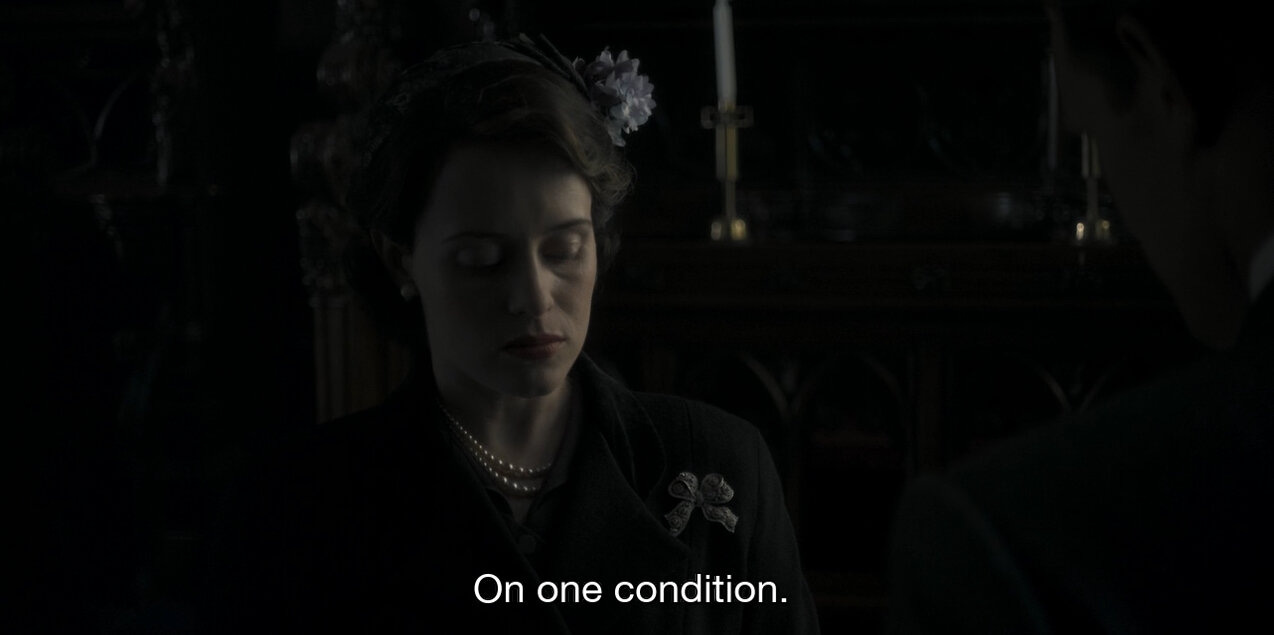
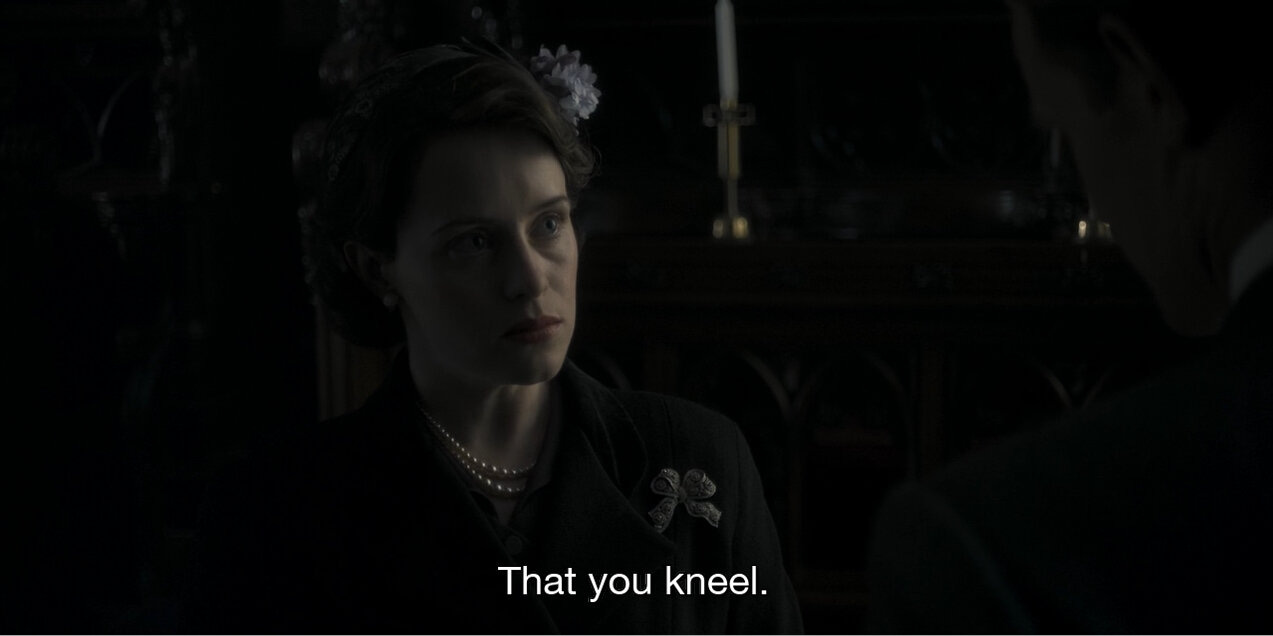
Now it's Philip's turn to protest.
"I merely asked the question whether in this day and age it was right that the Queen's consort, her husband, should kneel to her rather than stand beside her," he explains.
"You won't be kneeling to me," she replies.
"It will feel like a eunuch, an amoeba, is kneeling before his wife."
"You'll be kneeling before God and the Crown as we all do."
"I don't see you kneeling before anyone," snaps Philip.
"I'm not kneeling because I'm already flattened under the weight of this thing."
The duel of words continues. Philip accuses her of becoming entitled and power-hungry. She says he's acting weak and insecure.
"I want to be married to my wife," he says, trying another tack.
"I am both and a strong man would be able to kneel to both." Oh snap.
"I will not kneel before my wife."
"Your wife is not asking you to."
"But my Queen commands me?"
"Yes."
Oh you gonna bend that knee Philip. Nothing but respect for my Queen.
On the day of the coronation, David Windsor is back at home in Paris, providing a running commentary on the ceremony to the audience gathered in front of the television at his viewing party in Paris. He mocks the uncomfortable Gold Coach carrying the Queen to Westminster Abbey, but we see him seated in the front row of his gathering, leaning in to catch every detail of the ceremony he yearns to attend.
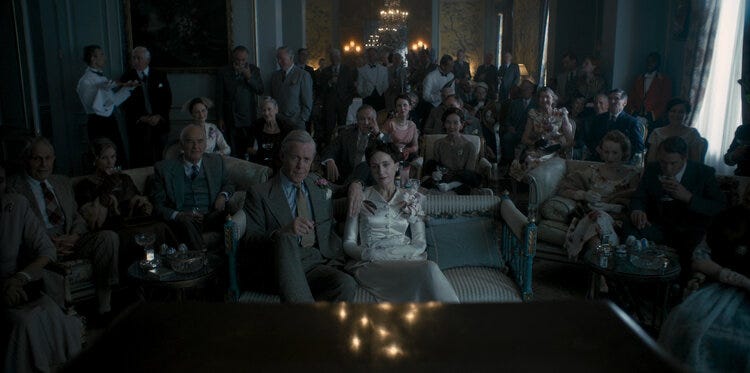
At Westminster Abbey, the television producer constructs the telecast, choosing from a series of camera angles projected on a bank of televisions in the production area. This is the new choreography of power, the assembly of moving images. We see the procession on small black and white television screens, first in the home of David Windsor, then in video village where the television producer is calling out shot. The ceremony seems inconsequential, almost squalid, seen on such poor monitors, but the power of the medium lies in the millions of people watching it for the first time in homes around England and across the globe.
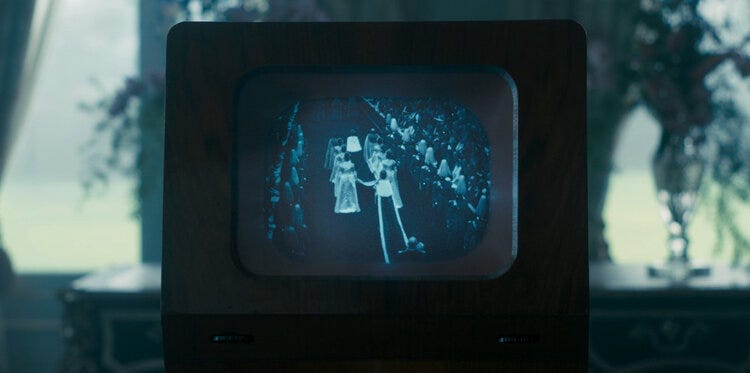
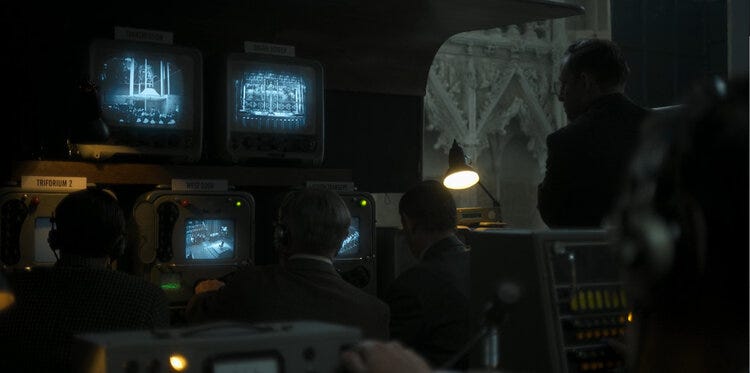
David Windsor fields questions at his party, describing each stage of a coronation ceremony he knows by heart.
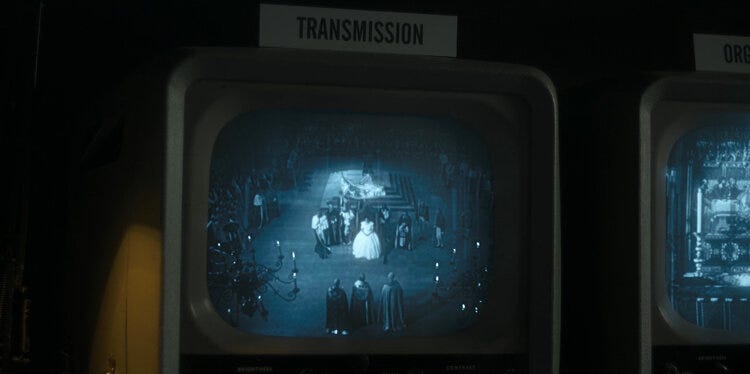
Then, just as Elizabeth prepares to be anointed, the television broadcast cuts away to a static shot. The audio continues, but the ceremony is no longer visible.
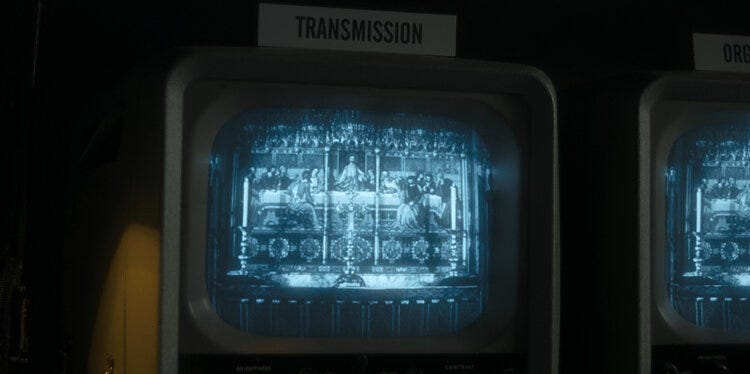
"Where'd she go?" asks a guest at the party.
"And now we come to the anointing," explains David. "The single most holy, most solemn, most sacred moment of the entire service."
"So how come we don't get to see it?" asks that same guest.
"Because we are mortals," replies David.
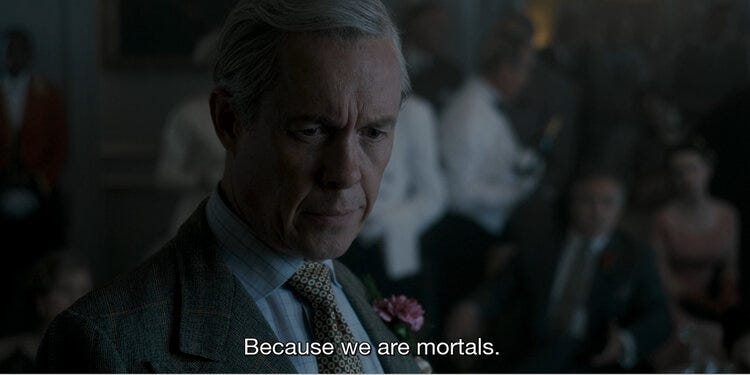
But at that moment, the TV show The Crown cuts to a shot from the interior of Westminster Abbey, the camera dollies in towards Elizabeth under the golden canopy held over her head. We, the viewers of The Crown, do get to see the anointing. A TV camera will take us there. Because we are modern TV viewers, and we are not mortals, we are now gods. The actual broadcast, in 1953 (still available on YouTube), preserved the sacred nature of the anointing, shielding it from mortal eyes. The Crown, a television show in the 21st century, has a different goal.
The Archbishop begins the oath. "Will you maintain and preserve..." He pauses, tripping on on his memory. He did not stumble during the actual coronation, but showrunner Peter Morgan adds this moment in order to recall the opening of this episode when a young Elizabeth rehearsed the ceremony with her father. It's a bit of dramatic license that pays for itself with the emotional round-trip.
Elizabeth realizes the Archbishop's predicament and steps in to complete the Oath for him. "Inviolably?" she says. Her father taught her the meaning of the word when they rehearsed the oath some 17 years prior, and in reciting it once again, she has now finally internalized the weight of the office, as her father did before her. She bonds across time with her deceased father one more time.
"I will," she proceeds, completing the oath.
Next we see product-commercial-grade closeups of the holy oil, backlit as if it were the nectar of the gods, and effectively it is. Water into wine, wine into blood.
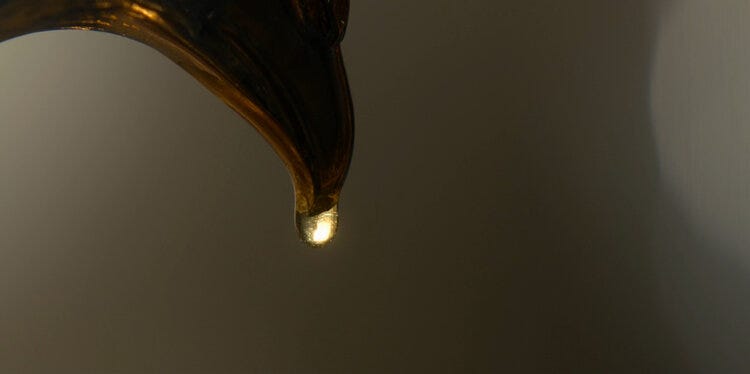
The Archbishop anoints her hands, her breast, and finally her head with the oil.
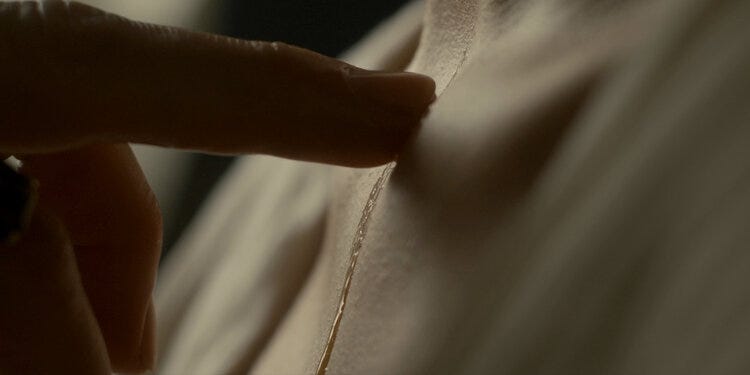
Morgan leaves the next part of the oath unchanged, and why not? The words are replete with gravity even today.
"As Kings, priests, and prophets were anointed, and as Solomon was anointed King by Zadok the priest and Nathan the prophet, so be thou anointed, blessed, and consecrated Queen over the peoples whom the Lord the God hath given thee to rule and govern, in the name of the Father, and of the Son, and of the Holy Ghost. Amen."
But also, we, as viewers, in this moment, and all the episodes before and after, anoint Claire Foy, actress, with our full adoration. She is our Queen Elizabeth in this television series. It's the same covenant we make with Robert Downey Jr. when we anoint him our Iron Man, or Chris Evans our Captain America, or Mark Hamill our Luke Skywalker. The Archbishop anoints Elizabeth Queen with oil and oaths and incantations, while the entire cast and crew of The Crown transform Claire Foy into the fictional Queen Elizabeth through the act of filmmaking, transmitted to us through the medium of television, so that we the audience may crown her.
In Paris, David Windsor soaks in the moment. He is our guide to the alchemic power of the coronation, but also to that of television. He stands in for the people of England, and television audiences everywhere.
"Oils and oaths. Orbs and scepters. Symbol upon symbol. An unfathomable web of arcane mystery and liturgy. Blurring so many lines no clergyman or historian or lawyer could ever untangle any of it." He stops just short of tossing in the title of the episode, "smoke and mirrors."
"It's crazy," says that same talkative house guest. "Smoke and mirrors" are commonly used as a term of derision. As viewers of this episode, we're watching a bunch of actors in makeup play-acting. Crazy indeed.
But Windsor understands the mythic power of the ritual, and we, in our emotional absorption in this moment, feel the power of the medium of television. Whereas earlier Windsor mocked his family, dismissed the Queen, and punctured the pomp with sarcastic quips, now he can't help but be spellbound by the symbolic force of it all. In a beautiful shot, we see his face, full of yearning, reflected in his TV screen, his niece, now his Queen, on screen.
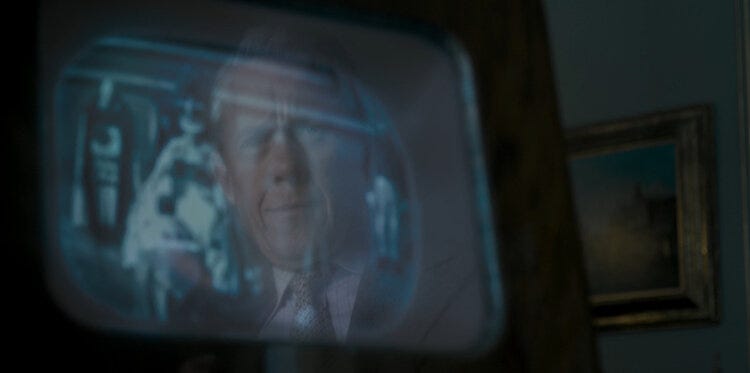
David corrects his guest. "On the contrary. it's perfectly sane. Who wants transparency when you can have magic. Who wants prose when you can have poetry? Pull away the veil and what are you left with? An ordinary young woman of modest ability and little imagination. But wrap her up like this anoint her with oil, and hey, presto, what do you have? "
He pauses.
"A goddess."
I sometimes watch videos of YouTube vloggers greeting throngs of young fans at conferences around the world. Like that guest at David Windsor's viewing party, many see this and dismiss it as crazy. To do so is to misunderstand the nature of adulation and how a new generation of celebrity use new mediums like YouTube and Instagram to their full effect, to create their own covenants with their own band of pilgrims.
Back at Westminster Abbey, one step remains. Philip, time to bend the knee bitch! With great reluctance, he removes his crown, saunters to the throne, and drops to one knee before his wife, and his Queen.
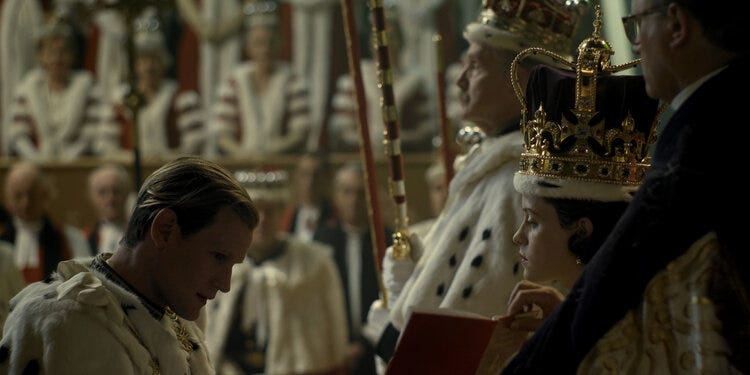
The expressions Matt Smith and Claire Foy trade as he pledges his fealty tell us all we need to follow the inner struggle in their hearts, and again, we register all these micro-expressions through the magic of the close-up and the liturgy of film. Shot, reverse shot, shot, reverse shot. A wordless conversation of images.
The episode concludes back in Paris. As the sun sets, David, Duke of Windsor, pulls out his bagpipes and plays in his yard. As his wife noted earlier, he plays when he's homesick (there is barely a single line in this episode that doesn't come back to pay off like Chekhov's gun, the script is that tightly wound). The camera pulls back and up into the sky behind him, framing a beautiful lens flare, as if Elizabeth's royal presence is shining down on him from above his former home of England.
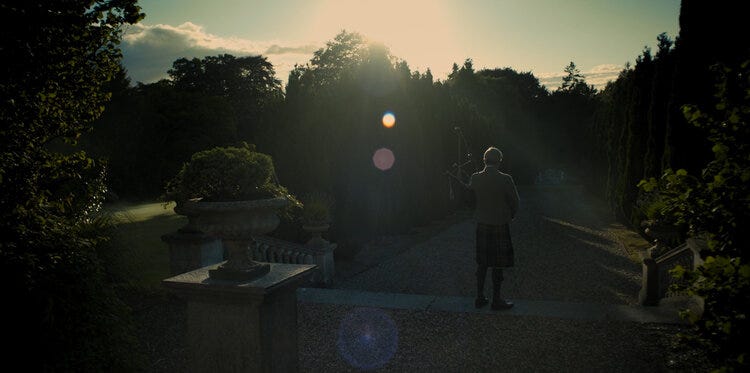
We end on a shot from the other direction, a medium shot of Windsor from head-on. His eyes brim with tears.
